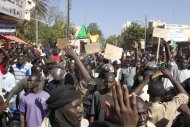The UN Security Council unanimously approved sending
an African-led military force to help reconquer northern Mali from
Islamist militants.
A Security Council resolution gave the force an initial one-year
mandate to use "all necessary measures" to help Mali's government take
back territory from "terrorist, extremist and armed groups."But the 15-member council said military force can only be used after political efforts have been exhausted and insisted that the military plans will have to be refined and approved before any offensive starts.
West African nations say they have 3,300 troops ready to go to Mali to help rebuild the country's army and support a military operation, which is not expected to start before September next year.
Tuareg rebels and other separatists and Al-Qaeda linked groups took advantage of a coup in Mali in March to seize a vast chunk of territory where the militants have imposed a brutal form of Islamic law.
Mali's Foreign Minister Tieman Coulibaly welcomed the resolution as "an historic step" in the battle against Al-Qaeda in the Islamic Maghreb and its allies.
France drew up the resolution after weeks of talks with the United States, which had expressed doubts that the proposed Economic Community of West African States (ECOWAS) force would be tough enough for the desert battle against the militants.
The United States finally co-sponsored the resolution voted Thursday and is expected to become a major backer of the new force.
France and the United States are already working with the Malian army.
The resolution orders political efforts to draw the Tuareg rebels into a coalition against the Islamists. In parallel European nations and the international force, the African-led International Support Mission in Mali (AFISMA), will train Mali's enfeebled army.
A move toward an offensive will come in a second phase.
The resolution says "military planning will need to be further refined" and sets down benchmarks for political progress and military preparations that will have to be met before a final onslaught against the Islamists is approved.
It said UN Secretary General Ban Ki-moon, ECOWAS, the African Union and other states involved will have to secure "the council's satisfaction with the planned military offensive operation" before hostilities can start.
"Nobody is ignoring the complexity of the task that awaits the international community to restore the territorial integrity of Mali and to end the terrorist activities in the north of the country," said France's UN ambassador Gerard Araud.
Funding has been another controversy ahead of the force's approval. Ban angered African nations when he said the United Nations cannot pay for the force. He is now under pressure to find ways to provide cash for logistics support to the force, diplomats said.
The resolution called on UN member states and international organizations to pay for AFISMA. The Security Council said it would consider setting up a new UN fund for equipment and services for the force.
Ban has raised doubts about the military force and has insisted that political efforts to end the conflict be strenuously carried out before force is used.
The United States and European nations agree that Al-Qaeda in the Islamic Maghreb and its allies, the Movement for Oneness and Jihad in West Africa (MUJAO) and Ansar Dine (Defenders of the Faith) cannot be left to create a terrorist safe haven in Mali.
They have not yet agreed the tactics to be used and this will have to be further refined in coming months.
The United States has said the battle against the militants should be a counter-terrorism operation that needs specialist fighters. It has suggested that troops from Chad, veterans of desert battles, be brought in to help the West African force.
France and other European nations have said the operation has to be led by the Mali army to be accepted by the country's population.
While the UN resolution stressed the need for international troops "to reduce the impact of military action upon the civilian population," rights groups have called for "serious safeguards" to be put in place to prevent human rights abuses.
"We fear any intensification of violence could affect the civilian population with an increase in humanitarian needs and the continued displacement of people," said Michael Quinn, Oxfam country director in Mali.
The conflict has so far displaced more than 400,000 people, according to the UN.
 2:15 AM
2:15 AM
 specialshowtoday
specialshowtoday


 Posted in:
Posted in: 

0 comments:
Post a Comment